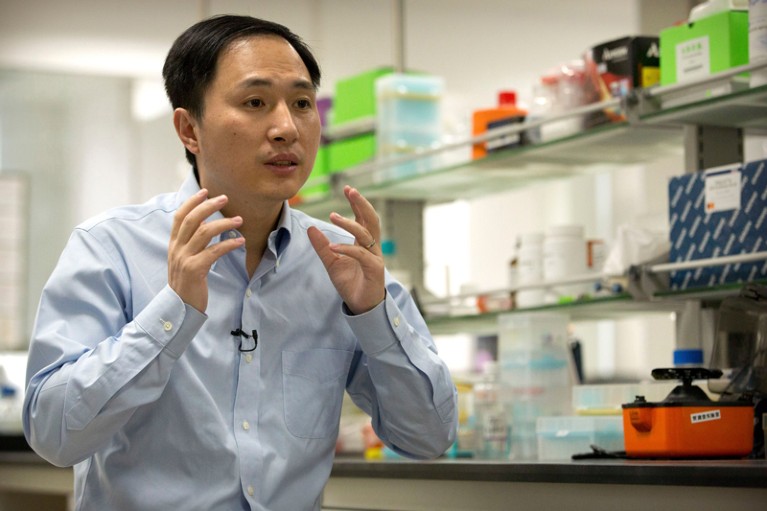Born in 1984 in a remote village in Xinhua County, Hunan Province, China, He Jiankui grew up in poverty. His village lacked electricity, and resources were scarce. However, his intellectual abilities were evident early on, and his family supported his education. His determination and relentless study earned him a place in a gifted student program at Xinhua School.
After high school, He pursued physics at the University of Science and Technology of China and later earned his PhD at Rice University in Houston, USA. His doctoral research focused on statistical models to analyze complex systems, but he soon discovered his true passion: genetic engineering.
China’s Scientific Advancements and He’s Rise
In 1996, scientists in Scotland successfully cloned the sheep Dolly, marking a turning point in regenerative medicine. This breakthrough fueled China’s investment in biotechnology. Between 1992 and 2019, China’s research and development spending skyrocketed from $2.2 billion to $350 billion.
China sought to attract top talent, launching initiatives to bring back scientists from abroad. In 2012, He Jiankui was recruited by the Southern University of Science and Technology in Shenzhen to establish his own lab. His biotech startups and research earned him recognition, making him a rising star in genome editing.
The Secret CRISPR Experiment
In 2017, He took an unpaid leave from his university position to embark on a secret project. That same year, an HIV-positive man in China responded to an ad offering free experimental fertility treatment. The application form included a question: “Would you be interested in a gene therapy that could reduce your child’s risk of contracting HIV?”
He’s team aimed to use CRISPR-Cas9 gene editing to modify embryos and make them resistant to HIV. By targeting the CCR5 gene, they attempted to introduce the CCR5 Δ32 mutation, known for its natural resistance to certain HIV strains.
Six other couples were enrolled in the trial, conducted under strict confidentiality. China prohibited fertility treatment for HIV-positive individuals, making the experiment highly secretive.
The Birth of Genetically Edited Babies
In October 2018, twin girls Lulu and Nana were born via emergency C-section. Their early health appeared stable, but the gene-editing procedure was concealed from hospital staff.
On November 25, 2018, journalist Antonio Regalado discovered a clinical trial document online describing CRISPR gene editing to prevent HIV in embryos. His investigation led to an exposé, forcing He Jiankui to reveal his work at the Second International Summit on Human Genome Editing.
Global Backlash and Ethical Violations
During his presentation on November 28, He Jiankui announced the birth of the first gene-edited babies and hinted at a third child’s birth. Scientists reacted with shock and criticism, condemning his lack of transparency, ethical oversight, and safety protocols. Nobel laureate Jennifer Doudna described the revelation as “horrifying” and “physically sickening.”
Reports soon emerged of forged ethical approval documents, and scientific journals rejected He’s manuscript due to irregularities. Chinese authorities arrested him in January 2019, and President Xi Jinping called for new gene-editing regulations.
Scientific Concerns and Flaws in the Trial
In December 2019, He’s unpublished manuscript leaked, revealing serious flaws in his experiment. While he claimed successful genetic modifications, deeper analysis showed:
- One twin’s edit was only partially successful.
- The other twin had an unintended mutation.
- Some cells were edited while others were not, leading to mosaicism.
- An unforeseen mutation occurred in another chromosome, contradicting claims of precision.
Furthermore, the CCR5 Δ32 mutation only protects against certain HIV strains, making He’s approach impractical compared to conventional prevention methods like condoms, PrEP, and antiretroviral therapy.
Legal Consequences and Fallout
On December 13, 2019, He Jiankui and two colleagues were convicted of illegal medical practices. He was sentenced to three years in prison, while his collaborators received shorter sentences and fines. The scandal remains one of China’s most controversial scientific events.
A Reckless Attempt at Genetic Advancement
He Jiankui sought to revolutionize genetic engineering but instead created an ethical and scientific disaster. His experiment failed to create HIV-proof children, introduced unknown risks, and highlighted the dangers of premature human gene editing. Rather than a groundbreaking achievement, his work became a cautionary tale for the future of biotechnology.














